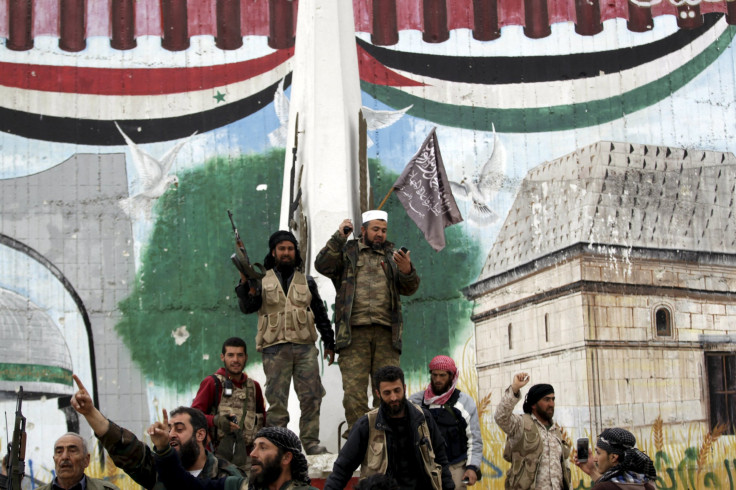Jabhat Al-Nusra's Win In Idlib Highlights Al Qaeda's Strategy To Defeat President Bashar Assad

The Syrian civil war began as a battle between Syrian opposition groups and President Bashar Assad’s regime, but the battleground quickly evolved into a kaleidoscope of brigades and battalions fighting each other, the regime and terrorist organizations like the Islamic State group. And now, four years into a conflict that is increasingly pulling in foreign fighters and international powers, one Syrian faction has emerged as the most effective one fighting Assad: al Qaeda.
Al Qaeda’s branch in Syria, Jabhat al-Nusra (JN), has capitalized on the threat of the Islamic State group, also known as ISIS, and the increasing ineffectiveness of moderate rebel groups. And it has succeeded on the ground thanks to a military strategy that relies on partnerships with other rebel groups, many of whom JN said it would be willing to include in a post-Assad Syrian government. Earlier this month, a group of Islamist rebel factions and JN formed an alliance with other groups that was coordinated through a so-called operations room. That proved to be the winning strategy in the fight for a key province, Idlib.
“The success of the offensive coordinated through the operations room demonstrates the effectiveness of JN’s model for military action against the Assad regime,” Jennifer Cafarella, a Syria analyst at the Institute for the Study of War, said. The model, she said, is “to establish joint operations rooms and to conduct well-coordinated attacks against the Assad regime that are led by JN but with the participation of other groups.”
While there are no confirmed headcounts for JN, the group has anywhere between 5,000 and 8,000 fighters in Syria. This is a small number compared to Assad’s roughly 150,000 troops and ISIS’ estimated ability to mobilize about 30,000. However, the group’s military strategy allows it to share resources with some of the most powerful rebel groups fighting the regime.
“While rarely acknowledged explicitly in public, the vast majority of the Syrian insurgency has coordinated closely with Al-Qaeda since mid-2012 -- and to great effect on the battlefield,” Charles Lister, a visiting fellow at the Brookings Doha Center, wrote in a recent brief.
In Aleppo, Syria's biggest city, JN is part of a joint military operations room with two of the most well-equipped anti-regime rebel brigades in the north: Jabhat Shamiya (the Levant Front) and Jabhat Ansar al-Deen (Front of Supporters of the Religion). The alliance gave JN access to resources pulled from a variety of formerly independent brigades, bringing together hard-line extremist groups with more secular units of the now almost disbanded Free Syrian Army.
Using joint operations rooms has been JN’s military strategy since the early years of the war. It may be a hardline jihadist group, but it is willing to appear as a defender of Syria rather than just an advocate for extreme religious rule.
“Many will make the argument that the Syrian insurgency — excluding Al-Qaeda and other like-minded jihadists — has become more uniformly Islamic in both appearance and rhetoric,” Lister wrote. “While this is undoubtedly true, it also does not take away from the fact that Syrians of all stripes still identify themselves as Syrians first.”
Sweets are being given out to the Syrian people in celebration of Idlib's victory. pic.twitter.com/pJi2OWORVG
— - (@sagiiso) March 30, 2015Unlike the Assad regime and ISIS, the majority of JN fighters are Syrian, which makes even the rebel groups with different ideological platforms from al Qaeda willing to partner for military operations against Assad. Foreign fighters play an increasing role in the war: Assad’s army is supported by Lebanese Hezbollah fighters and Iranian troops, and roughly 65 percent of ISIS fighters are foreign.
The question remains whether other rebel groups will be willing to enter into governance partnerships with JN if it rules under its harsh version of sharia law. On Monday, Jaysh al-Fatah issued a statement announcing that Idlib would be ruled under sharia law, but it did not mention JN specifically.
When the coalition to advance in Idlib was formed, JN leaders attached a Sharia Commission to the operations room in order to ensure that al Qaeda’s interpretation of Islamic law was followed during fighting. The commission included 10 “commandments” that members of the operations room were required to follow, such as avoiding civilian casualties and not bombing the city from the inside.
In December 2013, JN leader Abu Muhammad al-Julani appeared in a televised interview with al-Jazeera and announced that the group did not intend to rule Syria by itself, when the stage of “liberation” is reached. Instead, JN aimed to form an inclusive government of Syrian rebel leaders that would govern society under al Qaeda’s interpretation of sharia law.
“Nusra’s strategy in Syria is to foster the creation of joint governance activities alongside rebel partners in a way that gives JN considerable influence...and enables JN to craft the implementation of governance in its own image and its own interpretation of sharia law,” Cafarella said. “It wants to be the leading faction in implementation of governance, but not the only one.”
© Copyright IBTimes 2024. All rights reserved.





















